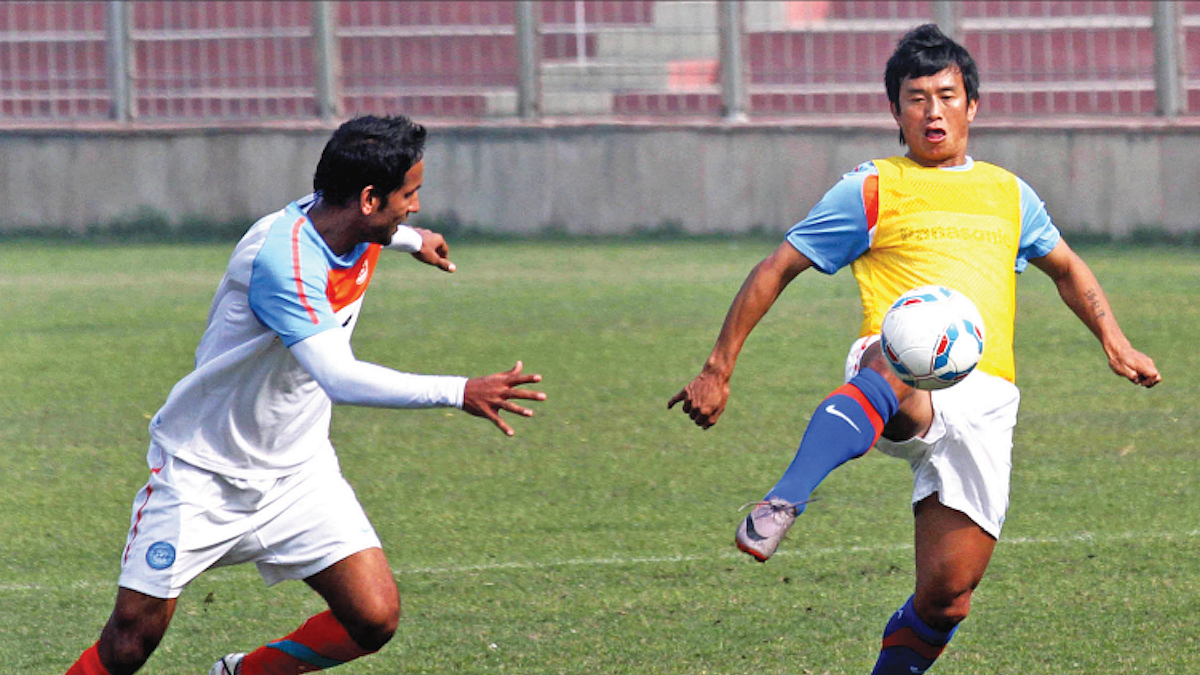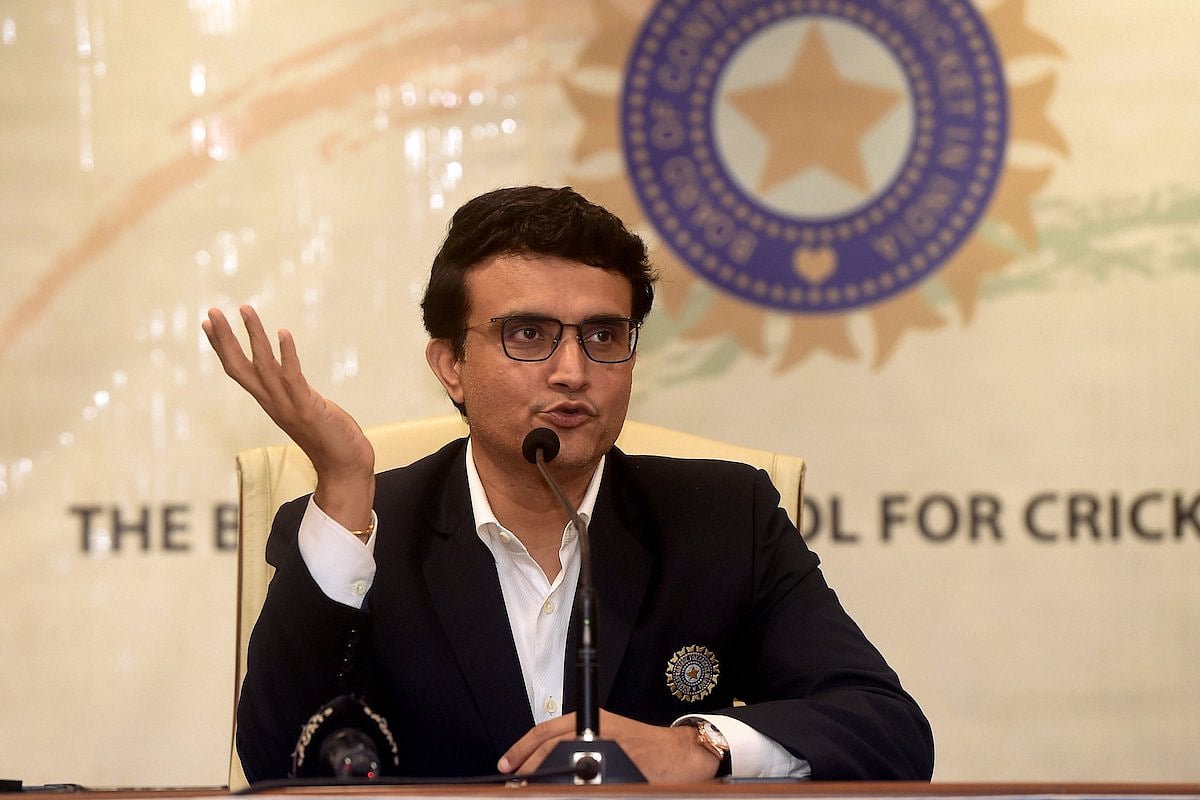The Real 'Power Play in Sports
If sports bodies in India have been the stomping ground of politicians, it has little to do with their administrative talent. Bhaichung Bhutia’s rout at AIFF president election makes perfect sense

Bhaichung Bhutia is easily India’s best-known footballer, past or present. For his adoring fans in India, and possibly even those less enamoured with him, it would have felt right—and looked good—if he led the All India Football Federation (AIFF), the body that controls football in the country.
But it was not to be. Bhutia recently lost the vote for AIFF president, polling just one vote against former Indian goalkeeper Kalyan Chaubey, who got all the remaining 33 votes. If you don’t know Chaubey, we are not surprised, but in his current avatar, he is a BJP leader in West Bengal.
Bhutia, who in electoral parlance would have forfeited his deposit with the 33-1 rout, was sulking even 24 hours after the result was announced. “I was shocked because I didn’t expect the political interference (in AIFF elections) would be of this level. This was to elect the AIFF president, and I wanted to contribute with sincerity,” Bhutia, a former captain of the national side, said in an interview.
By all accounts, it wasn’t quite a level-playing field for him. “If they (his opponents) were so confident of their victory, why did a powerful Union minister come to the hotel (where the voters were staying) at 9 pm (on September 1) and stayed back till 2 am in the morning of election day (Friday, Sept 2) and take all of them to a particular floor of the hotel,’’ he wondered aloud.
The minister concerned, according to members of Bhutia camp, was Kiren Rijiju, Union minister for law and justice who was formerly MoS, Sports—but Bhutia stopped short of taking names.


It may take a while for the dust to settle down, but the question that matters now is whether Chaubey can live up to the great expectations? His arrival in Kolkata after his victory—where he has turned out for both city giants Mohun Bagan and East Bengal during his playing career, whipped up a media frenzy—and to be fair, he made all the right noises.
“I am not here to say that India will play the World Cup in eight years unless we are hosting it. India is a diverse country and therefore, the solutions for the betterment of football must be specific to our need. No cut-and-paste solution is available for that,” he said. Sensible words these from Chaubey, the newly-elected president of All India Football Federation (AIFF).
But the 45-year-old former Indian goalkeeper is in the eye of a storm. His election has sharply polarised the Indian football community—and with good reasons—over the past two weeks. If Chaubey’s arrival has been a landmark moment in the history of AIFF with a well-known footballer taking over the hot seat for the first time, the political overtones which accompanied the elections and influenced the choice of Chaubey over the iconic Bhaichung Bhutia has made it a talking point in sporting circles.
The history of Indian sports officialdom is littered with names of politicians and industrialists with the right connections finding ways to corner plum positions in national and global sports bodies. From Madhav Rao Scindia and Sharad Pawar in cricket, Priya Ranjan Das Munshi and Praful Patel in football to Suresh Kalmadi in Indian Olympic Association (IOA), the list is long.
The relationship between these highly influential men and the sports bodies has been symbiotic; sports bodies, after all, need men in power to get things done. This could mean pushing for tax exemption for hosting the cricket world cup tournament to annual budgetary grants for sports bodies. But the Indian media and of late the Supreme Court have been in favour of placing reputed but retired sportspersons as sports administrators.
The prayers seem to have been answered with Sourav Ganguly, the charismatic former Indian captain, on the verge of completing a three-year term at the helm of BCCI. Chaubey’s qualifications, and the practical walkover he got in the election, need to seen in this light.

But do successful sportspersons necessarily make good administrators? The biggest example of such a crossover is the ‘Dada’ of Indian cricket.
A man of unquestionable stature, Ganguly nevertheless had the blessings of two political rivals during his rise in sports administration – first when he took over as the President of his state body Cricket Association of Bengal (CAB) without contesting an election with the blessings of state Chief Minister Mamata Banerjee and then of course, the BCCI hot seat with the blessings of Union home minister Amit Shah.
How does Ganguly’s record sheet look after a three-year term? A major achievement for the BCCI during his term had been their crisis management to host two seasons of IPL at the peak of Covid-19 pandemic, along with the decision of shifting last year’s T20 World Cup to the UAE as hosts.
There is, no doubt, an extremely well-oiled machinery at work at the BCCI—not to speak of the IPL— though Ganguly’s presence as the face of BCCI did help through the twists and turns.
There is, of course, a daylight of difference in the manner the BCCI and AIFF function. The cricket body, despite its often high-handed operations and lack of transparency, has marketed the game aggressively and a lot of the financial benefits have percolated down to its state bodies. The pandemic threw a spanner in Ganguly’s plans to introduce a contract system for domestic cricketers, but a full-length domestic calendar has nevertheless been announced after two years. The Board has also firmed up plans for women’s IPL next year.
It’s a much tougher road ahead for Chaubey’s new team at the AIFF. Not only will they have to start afresh after allegations of financial misappropriation against the previous regime, a lot of their success will depend on their chemistry with the Football Sports Development Limited (FSDL), the Reliance Groupbacked marketing arm of the AIFF which runs their flagship Indian Super League (ISL).

Reliance, led by Nita Ambani, has invested enough resources and energy over the past seven years to make ISL their number one league, despite the I-League being the original national league of the country.
However, Indian football circle insiders feel that the current regime of the AIFF—which is certain to enjoy tacit support from the central government—will find the going easier to be in sync with the FSDL. And that will be half the battle won for Chaubey.
The presence of successful sportspersons in top administrative jobs builds a perception that they will be above corruption – and this in turn creates a certain degree of credibility. Be it a Ganguly, a Chaubey or the likes of a Adille Sumariwala (a former Olympian and 100-metre national champion who is the president of Athletics Federation of India), they bring hope, though there could always be a gap between the expectations and delivery.
There have been a few jarring examples globally, with the biggest name coming to mind being that of Michel Platini, the French football legend who was the president of UEFA and was in running with the FIFA job. Platini’s collusion with Sepp Blatter, the disgraced former FIFA boss, had left a bitter taste in the mouth and created heartbreaks for legion of his admirers.
It’s a perception battle which Chaubey now has to fight and deliver both in both short and long terms on the pitch.
Follow us on: Facebook, Twitter, Google News, Instagram
Join our official telegram channel (@nationalherald) and stay updated with the latest headlines
